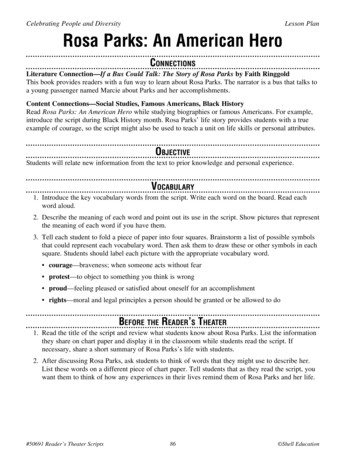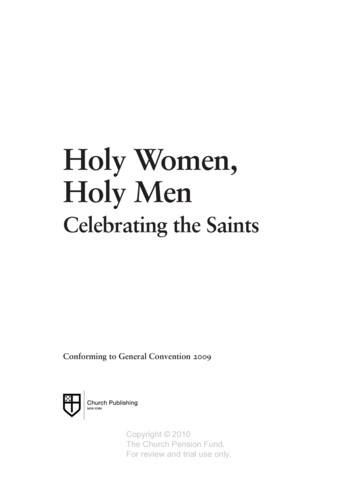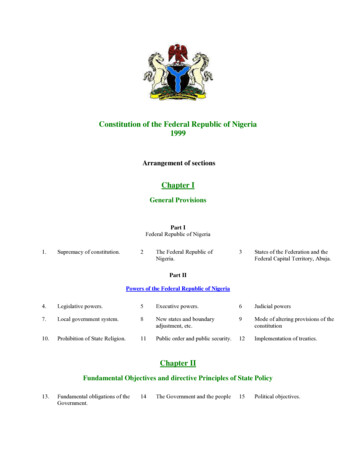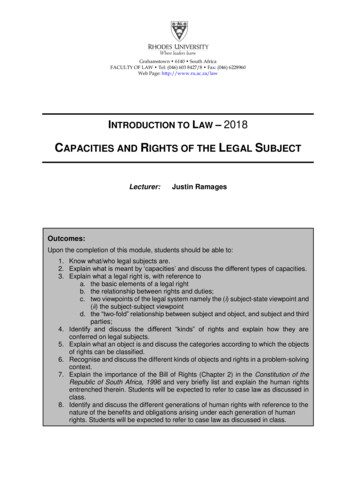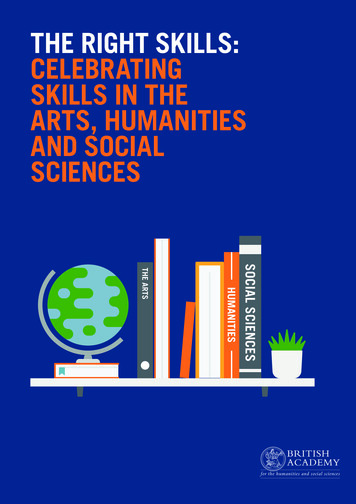
Transcription
THE RIGHT SKILLS:CELEBRATINGSKILLS IN THEARTS, HUMANITIESAND SOCIALSCIENCESSOCIAL SCIENCESHUMANITIESTHE ARTS
We are extremely grateful for the input of the Steering Group which oversawthis project. The full membership of the group is as follows:Professor Sir Ian Diamond FBA, Vice Chancellor and Principal,University of Aberdeen (Chair)Simon Blake, Chief Executive Officer, National Union of StudentsPhilippa De Villoutreys, Head of Talent, Bank of EnglandDr Rita Gardner, Director, Royal Geographical SocietyProfessor Roger Goodman, Chair, Academy of Social SciencesShelagh Green, President, Association of Graduate Careers Advisory Services(AGCAS) and University of EdinburghProfessor Martin Halliwell, Co-Chair, Arts and Humanities Alliance, and Universityof LeicesterProfessor Tony McEnery, Director of Research / Dr Frances Burstow, StrategicLead for Skills and Methods, Economic and Social Research Council (ESRC)Dr Julie McLaren, Associate Director of Programmes / Anne Sofield, AssociateDirector of Programmes, Arts and Humanities Research Council (AHRC)Chris Millward, Director of Policy, Higher Education Funding Councilfor England (HEFCE)Dame Una O’Brien, Executive coach and leadership consultant on the CivilService. Previously Chair of the Civil Service Talent Board and PermanentSecretary, Department of Health (2010 –16)Professor Simon Swain FBA, Pro-Vice-Chancellor External Engagement,University of WarwickProfessor Michael Wright FBA, Professor of Entrepreneurship, Imperial CollegeLondon Business SchoolThe project also benefited enormously from the input of its Advisory Group,the full membership of which is available at Annex 2.British Academy staffHarriet BarnesJoseph BuckleyMaxime DelattreTHE BRITISH ACADEMY10 –11 Carlton House TerraceLondon SW1Y 5AH 44 (0)20 7969 5200Registered Charity: Number 233176britishacademy.ac.uk Published November 2017Designed by Soapbox, www.soapbox.co.uk
THE RIGHT SKILLS:CELEBRATING SKILLSIN THE ARTS,HUMANITIES AND SOCIALSCIENCES (AHSS)
FOREWORDAt a time when the UK economy aims for inclusive growth; where it facesup to the prospect of greater engagement in bilateral relationships acrossthe world; where the creative industries are a national success story; wheredesign, marketing and human relations are critical to industrial and commercialsuccess; and at a time when societies across the world are ever more diverseand where the need for inclusive social policies are paramount, the skills thatcome from graduates of the arts, humanities and social sciences become evermore critical to the creation of the sort of society to which we would all liketo belong.Yet, at the same time, the benefits of degrees in the arts, humanities andsocial sciences are sometimes questioned. They are seen sometimes as ‘notbeing relevant’ or not imbuing students with a set of tangible skills. This reportaddresses this disjuncture of views by analysing the evidence on the skillsthat arts, humanities and social sciences graduates gain. It does so first bylooking at the skills that almost all arts, humanities and social science graduateswill gain by nature of their study; second, by asking what skills are gained byspecific courses; and third, by discussing those skills, not typically taught, butwhere employers in particular see a potential demand.It would be wrong to suggest that some of the skills gained by arts, humanitiesand social sciences graduates are unique – for example strong analyticskills are a feature of graduates from many disciplines – but the arts,humanities and social sciences bring a specific element, the ‘human’, thatis so necessary in today’s world. And the many case studies that appearin the report show how valued arts, humanities and social sciences graduatesare across a wide spectrum of employment, not only themselves but asmembers of interdisciplinary teams.It may seem obvious but there is no situation when every history graduatewill become a historian. Instead, the breadth of employment of historians istestament to the education that history graduates receive – and for history onecan substitute any of the arts, humanities and social sciences! Arts, humanitiesand social sciences education prepares well-rounded graduates for the twentyfirst century; and a working life when they will likely move between more thanone career.Yet it would be wrong to say that there were no gaps: the UK needs more peoplewith language skills, particularly those gained alongside an understanding ofsociety and culture; surely everyone should be able to interpret and manipulatenumbers; and as a nation we need a debate on the entrepreneurial andintrapreneurial skills that every arts, humanities and social sciences graduateshould have.Notwithstanding these gaps, there is an awful lot to celebrate in this report.Sometimes we underplay the breadth and diversity of our teaching and thededication, commitment and brilliance of our students. I hope this reportThe Right Skills: Celebrating Skills in the Arts, Humanities and Social Sciences (AHSS) 3
helps to address this and leads the British Academy to a programme of workthat continues to enunciate further the skills that arts, humanities and socialsciences graduates gain.I would like to thank wholeheartedly all those people on the Steering Group andAdvisory Group who have given so freely of their time to make this project asuccess. I would also like to thank all those people who contributed to the callfor evidence or took part in the focus groups. In particular, though, I would liketo acknowledge all those people at the British Academy who contributed to theproject, most notably Harriet Barnes, Joe Buckley and Maxime Delattre whosework has at all times been exemplary and beyond the call of duty.Professor Sir Ian Diamond FBA FRSE FAcSSChair of the British Academy Skills Flagship Project Steering GroupLead Fellow and Chair of the British Academy High Level Strategy Groupfor Quantitative SkillsAberdeen, November 2017British Academy 4
CONTENTSSummary 9Introduction 9What skills does the study of AHSS develop? 9What contributions do AHSS graduates make? 11Are AHSS graduates fit for the future? 121 Introduction 17About this project What do we mean by skills? How did we collect evidence? 1718182 What skills does the study of AHSS develop? 21Communication and collaboration Research and analysis Attitudes and behaviours 2223253 What contributions do AHSS graduates make? 29Contributing to innovation and prosperity through diverse employment Case study – Luke Ramm – Creative, Advertising Leaders and managers Civil Service Creative industries Case study – Andy J Ryan – TEAM GBR Photographer at Rio Olympic Games Case study – Hugo McDonaugh – Entrepreneur Cultural sector Case Study – Pardaad Chamsaz – Curator, British Library Other specialist roles Case study – Baillie Gifford – investment management firm Building a better society Case Study – Ellen Flint – Analyst, Civil Service Continuing the disciplines Responsible media Case Study – Bridget Kendall – Journalist Engagement with the arts and wellbeing 30313233343637383940404243444546474 Are AHSS graduates fit for the future? 49Growth in high-skilled jobs and increasing demand for high-level skills Adaptability, flexibility and life-long learning Entrepreneurial skills The ability to reason and thrive in a data and digital-driven environment The ability to thrive in a global context An interdisciplinary approach An engaged society embracing the challenges of the future 49505253545757Annex 1 Annex 2 6165
SUMMARYINTRODUCTION The arts, humanities and social sciences help us to understand ourselves,our society and our place in the world. They are vital to our abilityto understand and learn from the past and analyse the present, in orderto innovate and build for the future. The services sector represents 80% of the UK’s economy, and it hasa crucial role to play in the UK’s current and future economic growth.The financial services, legal services, professional services such as IT,accountancy and architecture, heritage, hospitality, retail and advertising,and the rapidly growing creative industries, depend on the skills whichstudy of the arts, humanities and social sciences develops. These areareas in which the UK has a strong competitive advantage, and which cancontribute to raising the productivity of our economy and to growing thenation’s overall wealth. We need a better understanding of whether the UK has the right balanceof skills for the future. So it is timely to hold a debate about the placeof education and skills in securing prosperity for society. It is critical thatthe arts, humanities and social sciences are included at the heart ofthis debate. This is the first overarching study of the skills developed through thestudy of the arts, humanities and social science. In this report we identifythe skills which are innate to the study of these disciplines, and look atthe contribution which their graduates make, to the economy through theemployment routes they take and in other ways they engage with society. The study is underpinned by a body of evidence which includes newanalyses of data on employment outcomes of graduates and focus groupswith students, as well as existing literature.WHAT SKILLS DOES THE STUDY OF AHSS DEVELOP? We have identified a common core of skills shared across the arts,humanities and social sciences (AHSS). Our analysis has shown that this core of skills is shared by undergraduateand postgraduate students, and early career researchers, althoughthe level of proficiency changes as an individual becomes more advancedin their study. These can be divided under three broad headings: communication and collaboration; research and analysis and; attitudes and behaviours characterised by independenceand adaptability. In addition to this set of core skills, there are skills more specific toindividual AHSS disciplines, including languages, high-level numeracy,qualitative analysis and data processing skills, geospatial skillsand practical production skills, content production, recording andbroadcasting and archival retrieval skills.The Right Skills: Celebrating Skills in the Arts, Humanities and Social Sciences (AHSS) 9
The arts, humanities and social sciences provide a particular context forthe development of skills with an understanding of the human dimensionin which they can be applied. AHSS students are able to use their skillsin employment, research, education and broader social contexts inways which are complementary to the skills and knowledge gained fromother disciplines.Communication and collaborationCommunication Clear and coherent explanation and description Persuasive argument underpinned by evidence Appropriate to purpose and audience, in tone and format, usingtechnology in ways which help convey the messageWorking with others Listening to and recognising different viewpoints, being sensitiveto cultural contexts Working with others to achieve common goals, using diplomacyand negotiation Taking on different roles and respecting others’ views Leading and motivating others, by understanding how to influencehuman behaviourResearch and analysisDesigning research and collecting evidence Formulating a research question and determining the evidenceneeded to answer it Locating and retrieving textual, numerical and visual information fromexisting sources Generating information through primary data collection Organising information from multiple sources, recognising itsrelevance and identifying gapsAnalysing Manipulating information and data, using technology whereappropriate Applying qualitative and quantitative methods of analysis Assessing what the evidence might mean, recognising whereit is incomplete, ambiguous or unreliable Evaluating findings to come to a conclusion, taking into accountdifferent perspectives and evaluating the complexity of the material Critical thinking and reflection on taken-for-granted ‘answers’to problems and value assumptionsDecision making Establishing criteria and evaluating evidence against them Generating a range of recommendations and assessing the meritsof each Taking responsibility for the decision reachedAttitudes and behavioursIndependence Working autonomously and motivating themselves Enthusiasm for enquiry, using initiative and taking responsibilityfor achieving goals Self-discipline, organisation and time managementBritish Academy 10
Problem solving Applying knowledge to find solutions, in a creative and innovative way Using resources effectively A positive, proactive and receptive attitudeAdaptability and creativity Willingness to try different approaches, open and receptiveto new ideas Ability to anticipate and accommodate change Commitment to ongoing learning and development, buildingon strengths and addressing weaknessesWHAT CONTRIBUTIONS DO AHSS GRADUATES MAKE?To the economy Our evidence shows that AHSS graduates are employed in a wide rangeof sectors and roles across the workforce, from financial services toeducation, social work, the media and creative industries. AHSS studentshave skills which open up a wide range of options, across the private,public and third sectors. AHSS graduates are able to move between careers over their workinglife, using their generic skills to adapt to different industries and becomesuccessful leaders and managers. In addition, there are a number ofdiscipline-specific employment routes, and AHSS graduates are also foundthroughout the creative industries and the cultural sectors, where theyapply the skills and knowledge of their disciplines more directly.The results of research from the British Council in 2015, showed that over halfof global leaders have either a social sciences (44%) or arts or humanities (11%)bachelor’s degree.A closer look at the education background of Chief Executives of FTSE100 Index Companies revealed that 58% have studied AHSS at some stagein higher education.A recent survey conducted by NESTA in relation to the last UK General Electiondemonstrated that 62% of the candidates had an AHSS background.The 2015 Fast Stream and Fast Track Annual report revealed that over65% of the successful candidates in the Civil Service had an AHSS background(humanities (24.3%), economics (20.5%) and social sciences (20.4%)).To society AHSS graduates contribute to society in many ways: They are a highly-skilled workforce employed in sectors whichunderpin society’s cohesiveness; They become academics who produce world-leading research whichunderwrites the social and economic health, wealth and reputationof the UK; They are active and engaged citizens and responsible mediaprofessionals; They contribute to arts and culture and the wellbeing of thewider population.The Right Skills: Celebrating Skills in the Arts, Humanities and Social Sciences (AHSS) 11
Their skills of critical analysis, problem solving, negotiation andcommunication, speaking other languages and understanding othercultures has intrinsic value with huge benefits for society, contributingto social cohesion at home and the UK’s prosperity and security abroad.ARE AHSS GRADUATES FIT FOR THE FUTURE? Technological, socio-economic, geopolitical and demographic changesare transforming the way we work. New jobs are constantly being created,and existing roles evolve. We have found that AHSS graduates are well placed both to shape thefuture and to take advantage of the opportunities the future will present.Growth in high-skilled jobs and increasing demand for high-level skills Skills such as teaching, social perceptiveness and coordination,and related knowledge from disciplines including psychology andanthropology, will be vital for organisations to operate in a culturalcontext where globalisation and digital technology are at the forefront. AHSS graduates are well placed to meet this demand, with skills incollecting and analysing evidence, decision-making, creativity andrecognition of multiple perspectives. AHSS graduates also bring an understanding of the humanconsequences of developments such as artificial intelligence, whichcan be used to shape the legal, moral and ethical frameworks whichneed to be created as part of the new digital age. The UK must recognise and invest in these high-level skills, whichare crucial for the jobs of the future, the UK economy, and ensuringthat our graduates are ready and can flourish in a global marketplace.We recommend that Government continues to invest in research andeducation in AHSS to enable the disciplines to make a difference in solvingthe challenges of the future.Adaptability, flexibility and life-long learning We know that in future we will need to be ready to adaptto changing circumstances and demands, and be comfortablenavigating uncertainty. AHSS graduates develop the skills to deal with this: a positive,open mindset, and willingness to try different approaches,anticipating and accommodating change. They also demonstratea commitment, desire and ability to constantly improve their ownlearning and performance. Our evidence shows the depth and diversity of AHSS graduates’careers, across many different sectors of the economy, and theprivate, public and third sector. But our research has also shownthat it is difficult to track the varied career paths that many AHSSgraduates take, particularly for postgraduate research studentsin employment outside higher education. It is vital that the future development of data sets to measurethe contribution of graduates recognises all the dimensionsof the contribution AHSS graduates make and do not becomecrude metrics based on salary.We recommend that Government, universities, higher education sector bodies,learned societies and employers work together to build a collective strategyfor collecting evidence about the career paths of AHSS students so that theBritish Academy 12
contribution they make to society and the economy can be properly measuredand celebrated.Entrepreneurial skills Entrepreneurial skills, the ability to generate new ideas and turn theminto a new venture or business, will be key for future workers, whetherself-employed or within an existing company. AHSS graduates have the latent skills to allow them to flourishas entrepreneurs. Their positive attitude, originality, creativeness andopenness to new ideas, flexibility, ability to work autonomously andmotivate themselves, combined with their strong communication,collaborative and team working skills make them ideal entrepreneurs. Support is needed to enable this huge potential to be fully realised.We recommend that universities continue to encourage and support AHSSstudents to develop a mindset of innovation and enterprise, to preparethem for roles in a global future where change is constant and whereworking environments are likely to be more fluid than they were for previousgenerations of graduates.The ability to reason and thrive in a data and digital-driven environment The ability to understand and interpret data developed throughthe study of AHSS is an essential feature of life in the 21st century:vital for the economy, for our society and for us as individuals. With the explosion of videos, blogs, podcasts and social mediapublications, in the future we will not only need to be digitally literatebut will need to be able to manage a world rich in information streamsand deal with cognitive overload. AHSS disciplines offer a rich context for developing these skillsand applying them to real-life situations, as well as makingthe acquisition of such skills open to a far wider range of students.The ability to thrive in a global context We live in an increasingly diverse, multicultural society. In anincreasingly global labour market and with more mobility in theworkforce, the world is more interconnected than ever. Languageskills, intercultural understanding, global awareness and aninternational mind set will be crucial for the future of the UK economy,society and for UK security and diplomacy. AHSS graduates are already equipped with many of the skillsrequired to thrive in a global context. These skills are not just limitedto language and area studies graduates, but are found in many AHSSdisciplines, including for example in history and geography, alongwith the broader skills of communication, diplomacy, negotiation andempathy which are shared across AHSS disciplines.We recommend that Government, universities and learned societies worktogether to realise the potential and added value of AHSS as a contextin which language, digital and data skills can be developed to ensure thatthe UK has the skills needed for productivity and growth in the 21st century.An interdisciplinary approach In an age of rapid and far-reaching social and technological change,the big challenges facing society will only be resolved through theapplication of multiple perspectives and insights from a range ofdisciplines. Individuals will need to interpret and understand conceptsacross several disciplines as well as be able to work alongside thoseThe Right Skills: Celebrating Skills in the Arts, Humanities and Social Sciences (AHSS) 13
from other disciplines to combine and integrate knowledge and skillstogether to solve complex problems. AHSS graduates are effective communicators and listeners,with the knowledge and expertise necessary to work with othersto achieve a common goal and understand their own and others’unique contributions. Their openness and willingness to try differentapproaches are essential skills for effective interdisciplinary work andworking with colleagues from other disciplines. Education at all stages needs to provide opportunities in which theseskills can be applied and refined.We recommend that Government and universities, working with learnedsocieties, ensure that the curriculum at all stages of education in schools andhigher education has opportunities for breadth and interdisciplinary working,in order to create a rounded, balanced population and workforce.An engaged society embracing the challenges of the future AHSS graduates participate in and contribute to civil society, bothin the UK and globally, drawing on their understanding of the humandimensions of society. Engagement with the arts and culture helpsindividuals understand themselves and their lives and appreciatethe diversity of human experience and cultures. AHSS graduates are valued in a wide range of professions, notnecessarily dependent on the specific knowledge of the subject theyhave studied. Their strong generic skills and flexibility mean thatthey are able to adjust to the requirements of work in many differentareas. Others go into specialist employment routes which are vitalto society, or go on to become the next generation of researchersenabling the disciplines to continue to contribute to the cultural, socialand economic health, wealth and reputation of the UK. It is vital that this contribution continues to be recognised and valued.We recommend that the AHSS subject community, universities and employerswork together to recognise, promote and signal the distinctiveness of theskills which students of AHSS demonstrate, and to increase understandingof their contribution to the economy and wider society among employers,prospective students and the public.British Academy 14
1British Academy 16
INTRODUCTION“The arts, humanitiesand social sciencesare driven by a desireto examine and explainhuman behaviour, tounderstand how societyfunctions, to learn fromthe past and apply thoselessons to the present,and to analyse thedrivers and implicationsof a changing worldand how differentcountries, places andcultures interact.”The arts, humanities and social sciences (AHSS) help us make sense of theworld around us. They are driven by a desire to examine and explain humanbehaviour, to understand how society functions, to learn from the past andapply those lessons to the present, and to analyse the drivers and implicationsof a changing world and how different countries, places and cultures interact.With the challenges the world is facing – for example, new technologies,globalisation, a growing and ageing society and the need for sustainabledevelopment – the insights from these subjects, both alone and set alongsidethose from science, technology and engineering, will be crucial.In an age of rapid and far-reaching social and technological change, the worldis increasingly interconnected and complex. This requires resilient individualswho can adapt and thrive in changing environments and who have high-levelskills which enable them to understand the big challenges facing society, whichwill only be resolved through the application of multiple perspectives andinsights from a range of disciplines.There is a growing need for a better understanding of whether the UK has gotthe right balance of skills for the future. It is timely therefore to hold an intelligentdebate about the place of education and skills in securing prosperity for societyand the critical role that the arts, humanities and social sciences will play at theheart of this debate.ABOUT THIS PROJECTThe British Academy launched this project to articulate the skills thatare inherent to the study of AHSS, and to explore their value to the individual,and the contribution they can make, in future, to society.This is the first time that an overarching study of skills across AHSS has beenconducted. The project is the first stage of the British Academy’s programme ofwork on skills to 2020, providing the evidence base from which further activitiescan be developed.The project has been framed around the following questions: What skills should studying AHSS develop? What skills do individuals who have studied AHSS demonstrate? What contribution do individuals with AHSS skills make to society andthe economy? What skills do employers want? What skills will be needed in the future?The report presents our findings in response to these questions.The Right Skills: Celebrating Skills in the Arts, Humanities and Social Sciences (AHSS) 17
WHAT DO WE MEAN BY SKILLS?The term ‘skills’ is widely used in everyday life, political discourse and ineducational contexts, often interchangeably with words such as ‘ability’,‘competence’ and ‘attribute’.1 It has been observed that “‘skill’ is at once heldto be a pivotal object for modern social and economic life, while also a conceptwith no consensus as to what exactly it refers to.”2 For this project, we haveadopted a broad understanding of ‘skills’ which goes beyond ‘what you can do’,to include attitudes and behaviours.3The scope of the project is ‘high-level skills’, those skills developed through thestudy of AHSS at degree level and above, including in the early stagesof a career in research in these subjects.4Over the course of our project on skills the British Academyhas engaged with more than 200 stakeholdersSector bodiesGovernmentUniversitiesIndustryThe British AcademyHOW DID WE COLLECT EVIDENCE?This report is the result of a year-long process of evidence-gatheringand consultation, alongside analysis of the existing literature in this area.Underpinning the report is a portfolio of evidence, all of which is availablein full on the British Academy website.5 This includes: A Call for Evidence opened between January and May 2017. This wasunderpinned by a synthesis of existing evidence. Respondents wereinvited to identify gaps and address the project questions. We received34 responses from individual researchers, research councils, highereducation institutions, learned societies, employer bodies, careers services,head-teachers, British Academy Fellows and government agencies. A mapping exercise of the QAA subject benchmark statements for thearts, humanities and social sciences. The analysis focussed on the12345Lyonette, C., Hunt, W and Baldauf, B. (2017). Occupations and Skills of Arts, Humanities and Social SciencesGraduates, section 2.2.1.Green, F. (2011). What is Skill? An Inter-Disciplinary Synthesis, LLAKES Research Paper 20Green, F. & Henseke, G. (2014). The changing graduate labour market: analysis using a new indicationof graduate jobs, LLAKES Research Paper v3/ONS SOC hierarchy view.htmlhttps://www.britac.ac.uk/skillsBritish Academy 18
subject-specific and generic skills defined in the current benchmarkstatements to identify common core skills which are shared across thedisciplines and other recurring themes. An analysis of the employment outcomes of graduates and postgraduateson courses in the arts, humanities and social sciences at UK highereducation institution. This included an analysis of the sectors in which theyare employed, the jobs they do, and the skills that they demonstrate, as wellas interviews with employers, and two focus groups with graduates. A series of focus groups with current undergraduate and postgraduateAHSS students to understand their perceptions and awareness of theirskills and the value they attribute to them.The findings were tested with stakeholder groups through a series of targetedroundtables, workshops and interviews with employers and representativesfrom the higher education sector (the full list can be found in Annex 2).The project was overseen by a Steering Group, chaired by Professor Sir IanDiamond, with expert representatives from the Academy’s Fellowship, theUK research and funding councils, the National Union of Students, learnedsocieties, careers services and employers.The Steering Group was supported by an Advisory Group which includedmembers from the academic community, employers, the voluntary sector andother stakeholder bodies.The Right Skills: Celebrating Skills in the Arts, Humanities and Social Sciences (AHSS) 19
2British Academy 20
WHAT SKILLS DOES THE STUDYOF AHSS DEVELOP?The study of AHSS focusses on assessing and evaluating historical, cultural,economic, social and politic
of education and skills in securing prosperity for society. It is critical that the arts, humanities and social sciences are included at the heart of this debate. This is the first overarching study of the skills developed through the study of the arts, humanities and social science. In this report we identify

